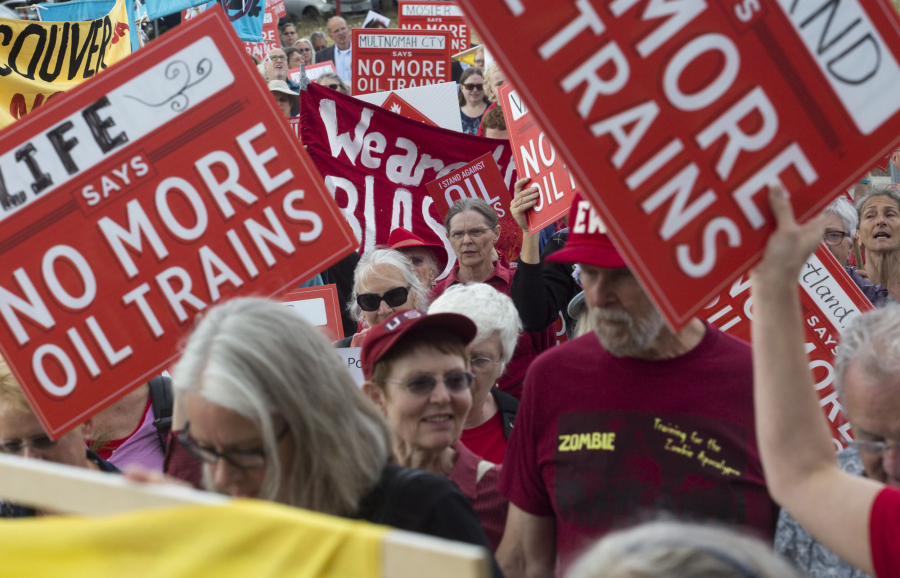Protesters broke into applause and gave Vancouver city councilors a standing ovation Monday night after they unanimously approved a ban on new oil refineries and facilities.
But the council’s vote won’t affect the nation’s largest crude-by-rail facility proposed for the Port of Vancouver that many protested shortly before the council meeting started.
Instead, the city’s ban would prohibit expansion of existing and new crude oil refineries and facilities that average less than 50,000 barrels a day.
Still, as many noted, the vote sends a message, including to Gov. Jay Inslee, who has the final say whether the Vancouver Energy project is approved.
“This will send the governor the message that we don’t want Tesoro-Savage, either,” said Don Steinke, a community organizer from Vancouver, referring to the Vancouver Energy proposal.
And, Dan Serres, conservation director with Columbia Riverkeeper said, “make no mistake, a new proposal could come at any time.”
Many of the protesters who testified during the meeting recalled last month’s fiery derailment in the tiny town of Mosier, Ore. Maria McCormick, who lives and farms in the Gorge town where the train derailed on June 3, told the city councilors the train crashed within 600 feet of an elementary school.
McCormick called crude-by-rail “predictable catastrophes.”
Alona Steinke read a statement from Arlene Burns, the mayor of Mosier, urging the council to “stand up for little towns” like Mosier “that don’t have the same power, but bear the risk of oil trains just the same.”
Then Steinke added, in her own words, “cities have to lead. We don’t have time for Congress to act.”
Others spoke of what type of community they envision Vancouver becoming, expressing hope that it wouldn’t become an oil town.
Port of Vancouver Commissioner Eric LaBrant, who was elected in large part due to his opposition of the Vancouver Energy oil terminal, thanked the city council for taking “deliberate and decisive action” to build a “city that makes sense for the future.”
One of the younger people to testify echoed the sentiment.
“It’s time we end oil terminals and we keep it in the ground, because the earth is a sacred place that we need to stand up and honor (it) and keep it clean,” said Vaughn Henderson, who at 19 years old announced his candidacy in May for state Senate in the 49th Legislative District.
Vancouver City Councilor Bill Turlay voted in favor of the ordinance but made it clear his concerns were about crude-by-rail safety.
“I don’t believe that man-made global warming is a problem for us,” he said, addressing some concerns about climate change made during the discussion.
More than 100 people protested outside the council’s chambers before the meeting started and about a dozen testified during the meeting, all urging the council to approve the ban.
The Vancouver Energy proposal is under review by the state Energy Facilities Site Evaluation Council. The project is so large, it falls under state jurisdiction. NuStar Energy, whose proposal suggested it could receive an average of 22,000 barrels of crude by rail daily, would also not be affected because its preliminary application is already being reviewed.
Vancouver Mayor Tim Leavitt closed the public hearing Monday night, telling the audience the council’s intention is to send a message.
“Our community can be vibrant, it can be prosperous, it can be enjoyable without the sorts of industries that could create circumstances that create otherwise,” Leavitt said. “We can do better than that in Vancouver, Washington and this council is saying we will do better than that.”




